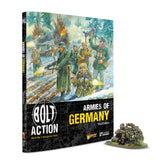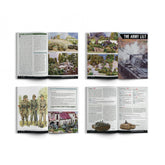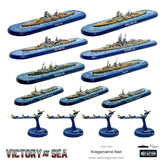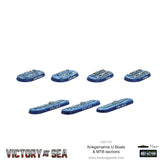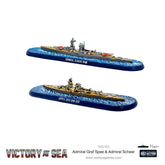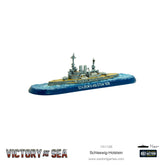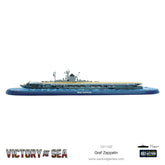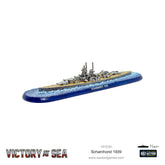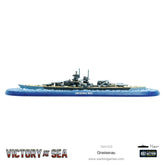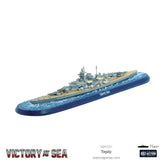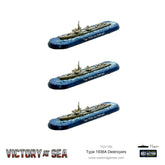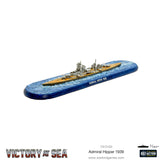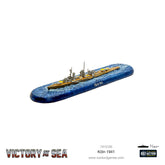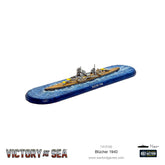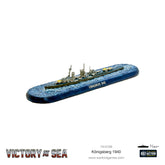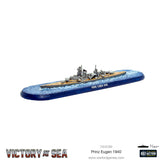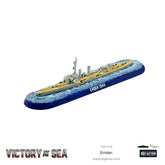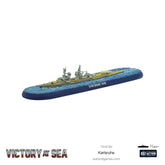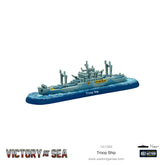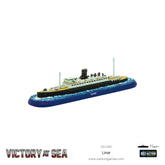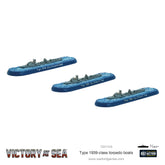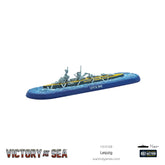Victory at Sea - Kriegsmarine
The Kriegsmarine was not a navy designed to tackle a major fleet head-on in engagements – it was primarily a commerce raiding force.
The Kriegsmarine had several powerful cruisers at its disposal, including what the British called ‘pocket battleships’ mounting heavier guns than a ship of their displacement normally would. The destroyers of the Kriegsmarine were excellent vessels, ship-for-ship they were a match for any destroyer afloat. German capital ships, such as the Scharnhorst, tied up large elements of the Royal Navy in case they took to open water and caused havoc amongst merchant convoys.
learn more about the Kriegsmarine fleet HERE
Filter
21 results
20
- 10
- 15
- 20
- 25
- 30
- 50
Featured
- Featured
- Best selling
- Alphabetically, A-Z
- Alphabetically, Z-A
- Price, low to high
- Price, high to low
- Date, old to new
- Date, new to old
Sort
Sort by:
- Featured
- Best selling
- Alphabetically, A-Z
- Alphabetically, Z-A
- Price, low to high
- Price, high to low
- Date, old to new
- Date, new to old
-
Victory at Sea Kriegsmarine fleet[countdown]2020/08/29 0:0:00[/countdown] The Kriegsmarine had to be virtually rebuilt after the First World War. Forbidden to own capital ships and submarines, Germany nibbled away at first one clause of the Treaty of Versailles, then another, until a powerful navy force existed. At the outbreak...
- €132,00
- €132,00
- Unit price
- / per
-
Victory at Sea - Kriegsmarine U-Boats & MTB sectionsSubmarines: A long-ranged submersible, the Type IX was the most successful U-boat of the war, with each vessel averaging over 100,000 tons of shipping sunk. One Type IX, U-107, made the most successful convoy mission of the war, with nearly 100,000 tons of shipping...
- €41,50
- €41,50
- Unit price
- / per
-
Victory at Sea: Cruisers - Admiral Graf Spee & Admiral ScheerThe Deutschland-class of warships were relatively small, by battleship standards, but were well armoured and carried the type of armament traditionally seen only on battleships. This led to them being nicknamed ‘pocket battleships’. Superb commerce raiders, the Admiral Scheer successfully plied the Atlantic and...
- €33,00
- €33,00
- Unit price
- / per
-
Victory at Sea: Schleswig-HolsteinThe pre-dreadnaught era Schelswig-Holstein enjoyed the dubious privilege of firing the opening shots of World War Two. Her barrage of the Westerplatte in Gdansk heralded the start of the German attack on the city. She was scuttled in March 1945, and some of her...
- €18,00
- €18,00
- Unit price
- / per
-
Victory at Sea - Graf ZeppelinThough laid down and launched before the start of the war, the Graf Zeppelin was never completed or commissioned, and it never saw action. Whilst four aircraft carriers of the class had originally been planned, constant in-fighting between the Kriegsmarine and Luftwaffe, as well...
- €29,50
- €29,50
- Unit price
- / per
-
Victory at Sea - ScharnhorstThe German capital ship Scharnhorst was the lead of her two ship class, launching in October 1936. She was armed with a main battery of nine 28cm C/34 guns in three triple turrets. Though plans were drawn up to 38cm guns, these plans were...
- €24,50
- €24,50
- Unit price
- / per
-
Victory at Sea - GneisenauWhile serving as commerce raiders, the Scharnhorst-class Battleships (or battlecruisers), Scharnhorst and Gneisenau were responsible for sinking over 105,000 tons of allied shipping in a single cruise. The two ships operated together for much of the early portion of the war, including sorties into...
- €24,50
- €24,50
- Unit price
- / per
-
Victory at Sea: TirpitzSister ship to the Bismarck, the Tirpitz was 2,000 tons heavier and thus the heaviest warship to have ever been produced by a European navy. She served in Norway and the Baltic Fleet acting as a potent deterrent. The Tirpitz became an obsession for...
- €24,50
- €24,50
- Unit price
- / per
-
Victory at Sea - Type 1936A DestroyersThe Type 1936 was a large and very powerful design mounting 5.9-inch guns, based on the general layout of the Type 1934. The intended twin turrets were not available in time, so planned armament was reduced to single mounts in some positions. As with...
- €33,00
- €33,00
- Unit price
- / per
-
Victory at Sea - Admiral HipperAdmiral Franz von Hipper was commander of the German battlecruiser squadron of the Battle of Jutland in 1916 and subsequently became commander-in-chief of the German high seas fleet. It was for him that Admiral Hipper was named, the lead ship of her class. Admiral...
- €20,00
- €20,00
- Unit price
- / per
-
Victory at Sea - KolnKöln was the third of the Königsberg-class of light cruiser, operating between 1929 and 1945, initially under the Reichsmarine and subsequently the Kriegsmarine. In the 1930s she served as a training vessel for cadets, but the outbreak of World War Two saw her conducting...
- €20,00
- €20,00
- Unit price
- / per
-
Victory at Sea - BlücherBlücher was named for Gebhard Leberecht von Blücher, who lead the Prussians to victory at Waterloo. She was the second of the Admiral Hipper-class of heavy cruisers, completed shortly after the outbreak of World War II. She was assigned to the task force supporting...
- €20,00
- €20,00
- Unit price
- / per
-
Victory at Sea - KonigsbergThe lead ship of her class, Königsberg had a similar operational history to that of her sister ships like Köln (see above), operating as a training vessel until the outset of World War Two. She spent the early part of the war laying defensive...
- €20,00
- €20,00
- Unit price
- / per
-
Victory at Sea - Prinz EugenThe third of the Admiral-Hipper-class of heavy cruisers, Prinz Eugen was named for Prince Eugene of Savoy, and 18th century Austrian general. She saw action during the German operation Rheinübung of 1941, in which, along with Bismarck, she attempted to breakout into the Atlantic...
- €20,00
- €20,00
- Unit price
- / per
-
Victory at Sea - EmdenEmden was the first new warship built in Germany after World War One. Her design followed that of German World War One-era cruisers, with her 5.9-inch guns in individual mounts rather than turrets. She served primarily as a training vessel and was the first...
- €20,00
- €20,00
- Unit price
- / per
-
Victory at Sea - KarlsruheSometimes called the K-class, these vessels were built to limits specified in the Treaty of Versailles. However, this had an impact on their structural integrity, and they did not endure long-distance voyages as well as had been hoped. The unusual triple three-gun turret design...
- €20,00
- €20,00
- Unit price
- / per
-
Victory at Sea - Troop ShipWhile the big liners represented the glamorous end of conveying armies around the globe (if such a word can be applied to those duties) smaller cargo liners performed as valuable a role carrying both troops and supplies. Contains one resin & metal vessel, with...
- €17,00
- €17,00
- Unit price
- / per
-
Victory at Sea - LinerDuring the 1920s and 1930s, liners plied the seaways as the ultimate symbol of travel luxury. After September 1939, many were requisitioned and served as fast troop transports, carrying thousands of troops across the globe. Contains one resin & metal vessel, with game aids....
- €17,00
- €17,00
- Unit price
- / per
-
Victory at Sea - Type 1939-class torpedo boatsMore commonly known to the Allies as the Elbing-class, the Type 1939 Flottentorpedoboot (fleet torpedo boat) was a marked improvement over the earlier Type 1937-class. The ship was more akin to a pre-war British destroyer, with a heavier gun armament, and better sea-keeping and...
- €33,00
- €33,00
- Unit price
- / per
-
Victory at Sea - LeipzigThe Leipzig and Nürnberg were improved versions of the K-class, being the only two vessels in the Leipzig-class of light cruisers. During WWII she she performed escort duties for warships in the Baltic and North seas where she and her sister ship, Nürnburg were...
- €20,00
- €20,00
- Unit price
- / per


